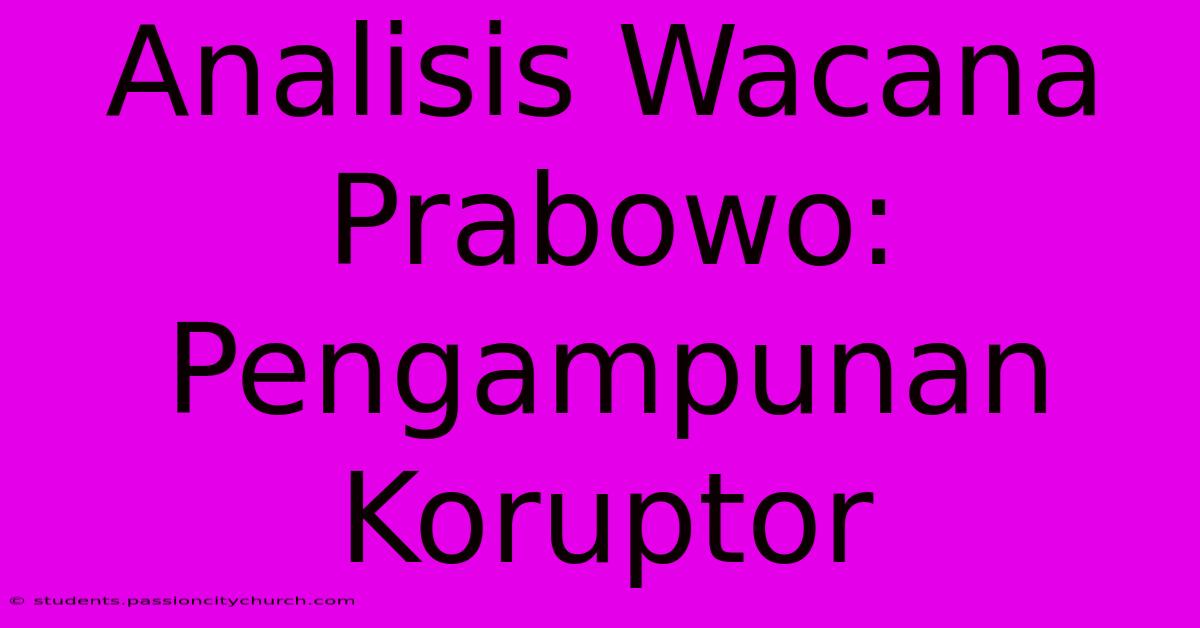Analisis Wacana Prabowo: Pengampunan Koruptor

Discover more detailed and exciting information on our website. Click the link below to start your adventure: Visit Best Website. Don't miss out!
Table of Contents
Analisis Wacana Prabowo: Pengampunan Koruptor – A Deep Dive into the Controversy
Prabowo Subianto's stance on corruption, specifically his statements regarding potential amnesty for corruptors, has sparked intense debate and scrutiny within Indonesian society. This analysis delves into the discourse surrounding Prabowo's pronouncements, examining the context, implications, and potential interpretations of his words. Understanding this complex issue requires a nuanced approach, considering the political landscape, public perception, and the broader ramifications of such a policy.
The Core of the Controversy: Interpreting Prabowo's Statements
Prabowo's statements on corruption haven't always been explicitly clear-cut. He has often spoken about the need for national unity and reconciliation, sometimes linking this concept to the possibility of granting amnesty to certain corruptors under specific conditions. This ambiguity has fueled much of the criticism leveled against him. The core question revolves around what those "specific conditions" entail and whether such an approach would ultimately undermine the fight against corruption.
Several interpretations exist. Some interpret his statements as a pragmatic approach to resolving long-standing conflicts and fostering economic growth. The argument is that certain corrupt acts, particularly those committed during a specific political climate or under duress, might warrant consideration for amnesty in the interest of national healing. This perspective emphasizes the potential benefits of reconciliation over the pursuit of punitive measures.
Conversely, critics vehemently oppose any form of amnesty for corruptors. They argue that such a move would send a dangerous signal, condoning corruption and undermining the rule of law. The potential for undermining public trust in the justice system and discouraging future prosecutions is a major concern. Furthermore, the argument is made that amnesty should not be considered unless there is a transparent and accountable process, which includes full disclosure, restitution, and genuine remorse from those involved.
Analyzing the Political Context: Strategic Maneuvering or Genuine Belief?
Understanding Prabowo's statements requires considering the political context. His statements on amnesty for corruptors haven't been made in isolation. They are part of a broader political strategy, aimed at consolidating support and appealing to different segments of the population. This necessitates a critical examination of whether his pronouncements reflect a genuine belief or a calculated political move to garner votes.
The Indonesian political landscape is complex, with deep-seated historical grievances and regional disparities. Prabowo's supporters often argue that his approach focuses on healing these wounds and fostering national unity. They believe that pursuing harsh punitive measures alone might exacerbate existing divisions. Conversely, critics argue that this approach prioritizes political expediency over upholding the principles of justice and accountability.
The Public Perception: A Divided Nation
Public perception is crucial in gauging the impact of Prabowo's statements. Polls and surveys reveal a deeply divided nation on this issue. While some segments of the population might favor a more reconciliatory approach, emphasizing the importance of national unity, others strongly oppose any form of amnesty, fearing it would legitimize corruption and undermine efforts to establish a just and equitable society.
This division is further complicated by the varying levels of trust in the Indonesian judicial system. The perception that the justice system is often slow, inefficient, and susceptible to political influence fuels skepticism towards both harsher punitive measures and potential amnesty schemes.
The International Dimension: Implications for Foreign Investment and Relations
Prabowo's statements on corruption have also drawn international attention. The international community generally places a high premium on the rule of law and the fight against corruption. Any perception that Indonesia is condoning corruption could negatively affect foreign investment and damage the country's international reputation.
Foreign investors are hesitant to invest in countries where corruption is rampant. Amnesty for corruptors might be interpreted as a sign of weakness in the fight against corruption, deterring investment and potentially damaging Indonesia’s economic prospects.
Conclusion: Navigating a Complex Issue
The discourse surrounding Prabowo's statements on amnesty for corruptors is a highly sensitive and complex issue. It highlights the inherent tension between the pursuit of justice, the desire for national reconciliation, and the need for economic development. A thorough analysis reveals a multitude of interpretations, influenced by political motivations, public sentiment, and international perceptions.
There is no simple answer to this complex question. Moving forward, it is crucial to have open and transparent discussions, ensuring that any policy regarding amnesty is carefully considered and aligns with the principles of justice, accountability, and the broader interests of the Indonesian nation. A balanced approach that acknowledges the importance of both reconciliation and the fight against corruption is essential to foster a stable and prosperous future for Indonesia. Further research and public discourse are needed to thoroughly analyze the long-term implications of any such policy. The continued debate and scrutiny surrounding this issue highlight its importance to Indonesia's future trajectory.

Thank you for visiting our website wich cover about Analisis Wacana Prabowo: Pengampunan Koruptor. We hope the information provided has been useful to you. Feel free to contact us if you have any questions or need further assistance. See you next time and dont miss to bookmark.
Also read the following articles
| Article Title | Date |
|---|---|
| Timothee Chalamet Good Singer Evidence | Dec 21, 2024 |
| Rettung Der Fruehchenstation In Suhl | Dec 21, 2024 |
| Sam Konstas Australias Boxing Hope | Dec 21, 2024 |
| Audiences Apres La Saison 4 Historique | Dec 21, 2024 |
| Antv Phk Perubahan Industri Tv | Dec 21, 2024 |
| Palpite Bayern X Leipzig Alemao 2020 | Dec 21, 2024 |
| How To Watch Bayern Vs Rb Bundesliga | Dec 21, 2024 |
| Musks Einfluss Auf Den Deutschen Wahlkampf | Dec 21, 2024 |
| Amuk Fans Malaysia Kerusakan Mobil | Dec 21, 2024 |
| Rey Mysterio Sr Dies Aged 66 | Dec 21, 2024 |
